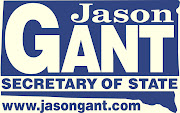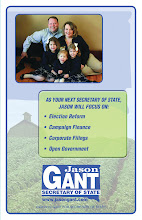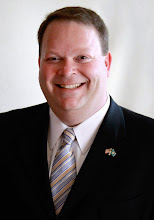State Candidates Offer Differing Views

State Candidates Offer Differing Views
By Nathan Johnson
nathan.johnson@yankton.net
Published:
While both vowed to uphold the integrity of South Dakota’s election process, two candidates for secretary of state drew some stark differences in their beliefs during a debate in Yankton Thursday.
Jason Gant, a 33-year-old Republican and former state legislator from Sioux Falls, faced off against Ben Nesselhuf, a 35-year-old Democrat and former legislator from Vermillion, at a forum sponsored by the South Dakota Farmers Union.
Lori Stacey, the 46-year-old Constitution Party candidate from Sioux Falls, was not in attendance, and it was not clear if she was invited to the event.
The three candidates are vying for the position held by Republican Chris Nelson, who has served two consecutive four-year terms and is term-limited.
The event, held at Yankton’s Technical Education Center, also included a brief forum with the District 18 legislative candidates.
Gant and Nesselhuf were divided on their views as to whether they would encourage the Legislature to pass legislation that would allow independents to participate in all primaries. Currently, parties decide whether they want to allow independents to vote in primaries, and the Democrats did allow them to participate this year.
“It’s another example of the government telling the people what to do, instead of allowing the people to tell the government what they want to do,” Gant said. “I don’t think it’s right that the South Dakota government should force the Democratic or Republican parties to allow independents into their primary.”
Nesselhuf said he believes in “forcing” parties to open up their primaries.
“These parties don’t exist in a bubble,” he said. “We are all interested parties in how their nominees are selected. I think we need to open that process up to as many voices as possible in order to bring the conversation back to the middle where most of us live. I think anybody who cares more about the health and well-being of the state over the health and well-being of a political party should support that.”
When asked about the current controversy over whether Democrats broke the law recently when offering food at early voting rallies on Native American reservations in the state, both candidates said Nelson, the current secretary of state, and Attorney General Marty Jackley had reacted properly in calling for an investigation of the accusations put forth by State Republican Party Chairman Bob Gray.
However, their views of what took place differed drastically.
Nesselhuf said he had been at early voting rallies in Mitchell, Sioux Falls, Brookings and Rapid City where items such as donuts and coffee were offered, yet there were no accusations that food was being used to entice people for their votes.
“Nobody says a damn thing until it happens on a reservation,” he said, growing emotional. “That plays off age-old racial divides in this state. It troubles me. ... It’s ridiculous to say that, somehow the Native Americans are so simple-minded that a bowl of chili is going to influence their vote, when you’re not willing to say the same thing anyplace else in the state. Nobody has filed any complaints on things that have happened. Food and politics have gone together since the beginning of food and politics.”
Gant countered that it was not a racial issue, and the illegality of offering anything of value in exchange for voting is quite clear.
“Anytime you are offering some sort of incentive and then giving rides to the polls, it’s like you are saying, ‘Here’s a donut. Now come vote for me,’” he said. “That is against the law.”
The candidates also differed on election-day voter registration. Gant said that, if allowed, it would open the door to voter fraud. Nesselhuf stated that, while he would not push for election-day voter registration, he believes it would be a positive step and is done successfully in many surrounding states.
Nesselhuf said that, as secretary of state, he would partner with Google and the Pew Research Center, as other states have done, to develop an application that would provide a place for voters to get all information relevant to voting. He said it could increase voter participation.
Gant said he would pursue online voter registration as a way of making it easier for people to get involved in the political process.
In a 30-minute forum involving the four candidates for two District 18 House seats, questions were asked about balancing the state budget, education funding, raises given to executive-level employees in state government and several other areas.
Asked about finding funds to address deteriorating roads around the state, all four agreed that the revenue is not currently there to address the issue.
“There are a lot of things that people think we need more funding for,” said Republican Nick Moser, who is seeking a second term. “I know a lot of people are concerned about roads. I went to a County Commission debate, and probably 85 percent of the questions were about roads. I’m of the opinion that, ultimately, the county has to care for its roads. I think that’s one of the big purviews of their responsibility. ... Certainly, I wouldn’t be able to sit here and say, ‘Definitely, I can guarantee you we’re going to put a lot more money into roads in our next term,’ because I think that’s going to be tough.”
Bernie Hunhoff, who is seeking a second term and is currently the House Minority Leader, said his sympathies are with the counties.
“We tried to fix the counties’ problem by adjusting license plates fees in the last few years,” the Democrat said. “The problem was, (Gov. Mike Rounds’ office) insisted that, if we did anything for the counties, he wanted money for the state highway department also. That would mean an increase in the gas tax. You really hate to increase a huge tax like that during a recession, so legislators in both parties were reluctant to do that. Eventually, we’re going to have to raise the gas tax. The recession is just not the time to do it.”
The Legislature’s current priorities are rightfully education and Medicaid, said Republican Charlii Gilson, who has previously served one term in the House.
“To me, taking care of people is more important than the roads,” she said. “The roads do need to be fixed. It’s a county issue, and what we can do about it? I don’t know. We’ve got to get the revenue somehow.”
To Democrat Jay Williams, the revenue sources are clear if the Legislature has the willingness to use them.
“I think the gas tax and maybe even the licensing fees could be raised to generate some revenue to (fix roads),” he said. “I wouldn’t be opposed to doing that immediately, instead of waiting until whenever we think the recession is over.”
The legislative candidates have three more public forums scheduled ahead of the Nov. 2 election. On Monday, they will be at a noon forum sponsored by Interchange and the Yankton Area Chamber of Commerce at Yankton’s Minerva’s. A 6 p.m. forum will be held next Thursday at The Center in Yankton. Finally, a noon forum focusing on health care will be held at the Avera Pavilion in Yankton on Friday, Oct. 29.









No comments:
Post a Comment